
Safety in Focus: Noise Protection
Noise in the workplace may be part and parcel of your day-to-day work, however excessive exposure to any noise for a long period of time can cause irreversible damage to your ears. Noise can come from equipment or from people that are working around you. Consistent exposure to loud noise can lead to hypersensitivity in your hearing, increased blood pressure and heart rate. At worst, if severe noise exposure is repeated over many years, the hair cells in your inner ear become permanently damaged resulting in permanent hearing loss. Loud noise can also create physical and psychological stress, reduce productivity, interfere with communication and concentration, and contribute to workplace accidents and injuries by making it difficult to hear warning signals.
Noise may be a problem in your workplace if:
You hear ringing or humming in your ears when you leave work.
You have to shout to be heard by a coworker an arm's length away.
You experience temporary hearing loss when leaving work.
What methods can be used to control noise exposure at work?
Report any machinery that is not functioning correctly - malfunctions commonly result in excess noise.
Use sound dampeners, silencers, noise barriers etc. to limit noise where possible.
Operating noisy machines during shifts when fewer people are exposed.
Suggest administrative controls (e.g. training and education, job rotation, job redesign or designing rosters) to reduce the number of workers exposed to noise.
Ensure you adhere to site requirements in relation to hearing protection AT ALL TIMES.
Check that you are wearing all protective gear correctly.
If your workplace is a noisy one, make sure to take all the proper precautions to protect your hearing, and don't forget to have your hearing checked annually.
